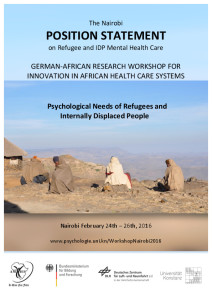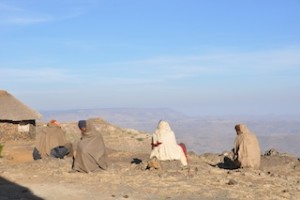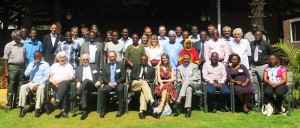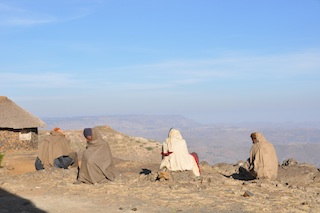
This statement is the product of a first workshop initiated by the German Federal Ministry of Education and Research that brought together a group of established and young researchers, clinicians and NGOs discussing ways to integrate the mental health care of displaced people into African national mental health care systems. In this paper, the group called for a better cooperation between national mental health care systems and international organizations supporting the mental health of displaced people. They criticized the situation that in many countries parallel mental health care systems are established and that both systems suffered from lack of resources. The group recommended that national mental health systems should be build up and further developed in the context of serving displaced peoples’ mental health needs. They identified several obstacles, e.g. the unwillingness of governments to prioritize mental health care and the challenge for NGOs to cooperate with government structures.
For the Nairobi Position Statement on Refugee and IDP Mental Health Care please follow this link.
Kenya
The Nairobi Position Statement on Refugee and IDP Mental Health Care

This statement is the product of a first workshop initiated by the German Federal Ministry of Education and Research that brought together a group of established and young researchers, clinicians and NGOs discussing ways to integrate the mental health care of displaced people into African national mental health care systems. In this paper, the group called for a better cooperation between national mental health care systems and international organizations supporting the mental health of displaced people. They criticized the situation that in many countries parallel mental health care systems are established and that both systems suffered from lack of resources. The group recommended that national mental health systems should be build up and further developed in the context of serving displaced peoples’ mental health needs. They identified several obstacles, e.g. the unwillingness of governments to prioritize mental health care and the challenge for NGOs to cooperate with government structures.
For the Nairobi Position Statement on Refugee and IDP Mental Health Care please follow this link.
German-African research workshop
for innovation in African health care systems

In February, the first German-African research workshop for innovation in African health care systems took place in Nairobi.
The workshop received high interest. In total, 54 participants and representatives from seven national and six international societies came together including African and German clinicians, scientists, representatives from universities and NGOs, well established researchers and talented young academics who could be supported with travel grants.

In 27 presentations and three round table discussions epidemiological aspects of mental health care for refugees as well as current challenges in health care systems were discussed in order to find new methods for innovation in health care and treatment.
The participants compiled the Nairobi Position Statement on Refugee and IDP Mental Health Care, which provides recommendations for further steps for improving mental health care in African countries.
for innovation in African health care systems

In February, the first German-African research workshop for innovation in African health care systems took place in Nairobi.
The workshop received high interest. In total, 54 participants and representatives from seven national and six international societies came together including African and German clinicians, scientists, representatives from universities and NGOs, well established researchers and talented young academics who could be supported with travel grants.

In 27 presentations and three round table discussions epidemiological aspects of mental health care for refugees as well as current challenges in health care systems were discussed in order to find new methods for innovation in health care and treatment.
The participants compiled the Nairobi Position Statement on Refugee and IDP Mental Health Care, which provides recommendations for further steps for improving mental health care in African countries.
Psychological needs of refugees and internally displaced people
German-African research workshop for innovation in African health care systems

Nairobi, February 24-26, 2016
In cooperation with vivo international this research workshop will take place in Kenya this month. With this research workshop we want to contribute to build up networks between Germany and African countries in order to further develop a research field that contributes to improve the lives of displaced people. This workshop is addressed to researchers, NGOs as well as national and international decision makers and organizations.
For further information, please follow this link to the workshop’s website.
German-African research workshop for innovation in African health care systems

Nairobi, February 24-26, 2016
In cooperation with vivo international this research workshop will take place in Kenya this month. With this research workshop we want to contribute to build up networks between Germany and African countries in order to further develop a research field that contributes to improve the lives of displaced people. This workshop is addressed to researchers, NGOs as well as national and international decision makers and organizations.
For further information, please follow this link to the workshop’s website.
Refugees in Kenya
Kenya is among the countries that host a very high number of refugees in relation to its population. With Kakuma and Dadab it operates two of the largest refugee camps in the world, where hundreds of thousands of refugees from Sudan, Somalia and other war-torn countries live for decades in a semi-arid region. More than half a million Somali refugees live in the country. The project in which vivo is cooperating tries to develop and evaluate adapted psychiatric treatment strategies that address PTSD, substance abuse and severe psychotic disorders.
Kenya is among the countries that host a very high number of refugees in relation to its population. With Kakuma and Dadab it operates two of the largest refugee camps in the world, where hundreds of thousands of refugees from Sudan, Somalia and other war-torn countries live for decades in a semi-arid region. More than half a million Somali refugees live in the country. The project in which vivo is cooperating tries to develop and evaluate adapted psychiatric treatment strategies that address PTSD, substance abuse and severe psychotic disorders.

